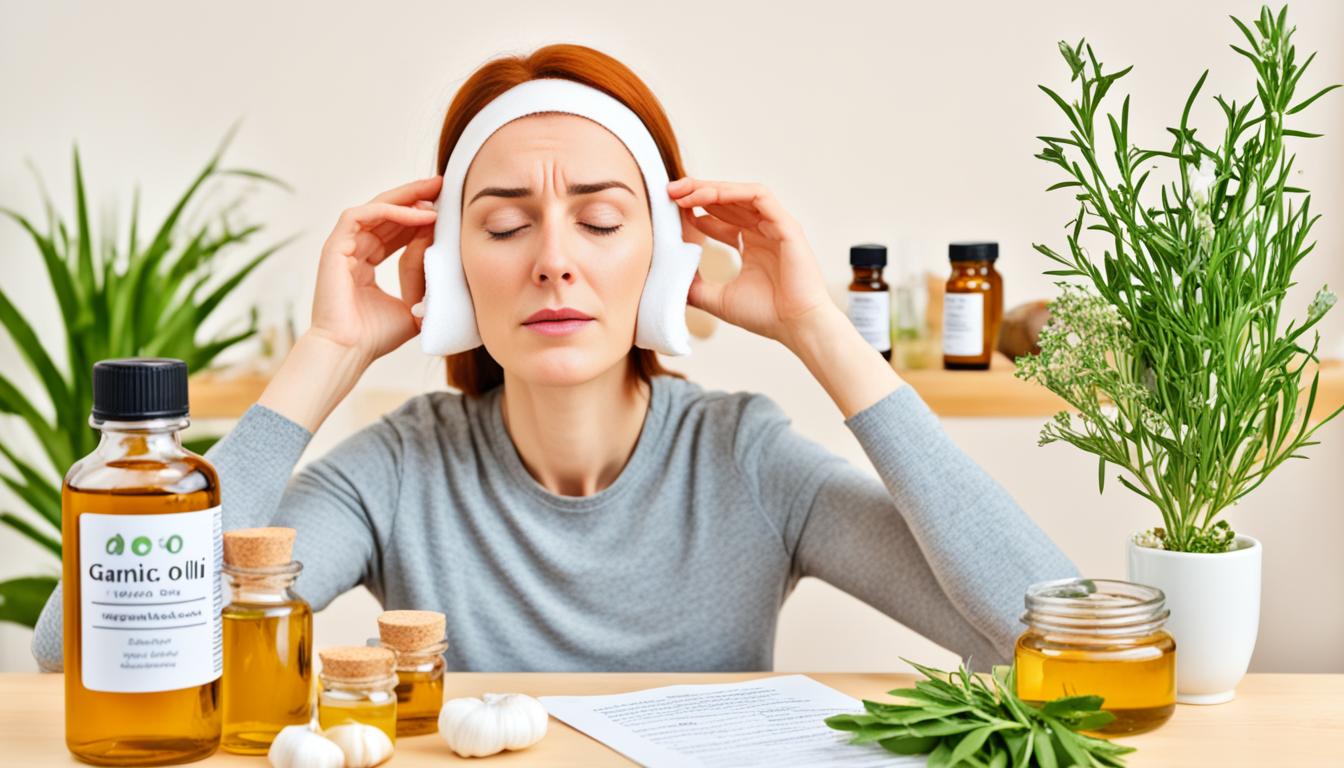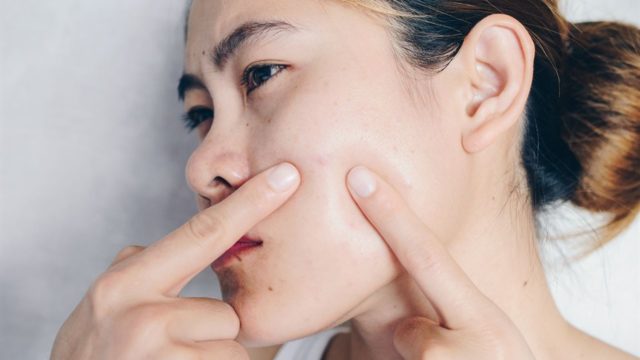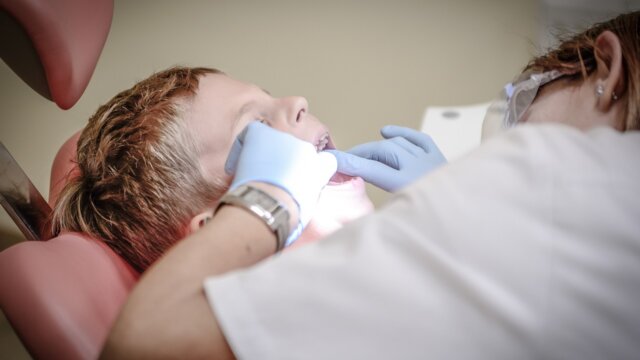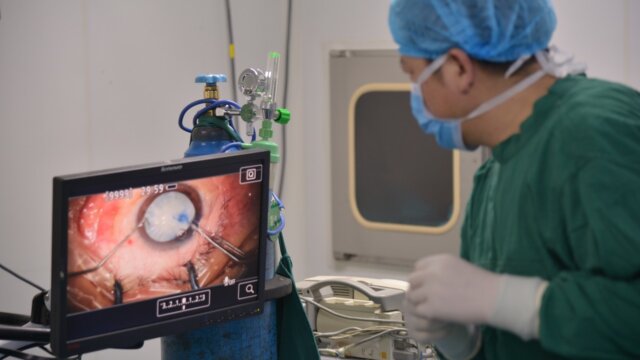FTC disclaimer: This post may contains affiliate links and we will be compensated if you click on a link and make a purchase.
Most ear infections get better by themselves, needing no antibiotics. So, if you have an ear infection, you might not need to see the doctor right now. Many home remedies can help ease the pain and help your body heal naturally.
Ear infections are common and can happen to anyone, not just kids. A lot of times, they go away on their own. But, you can also try natural ways at home to feel better and help your body heal. This article looks at these remedies to find what works best for your ear infection.
Key Takeaways
- Most ear infections can be treated with home remedies without the need for antibiotics
- Alternating warm and cold compresses can help manage ear pain associated with infections
- Over-the-counter pain relievers like ibuprofen and acetaminophen can provide relief
- Ginger and hydrogen peroxide can help reduce inflammation and clean the ears
- It’s important to see a doctor if symptoms persist or worsen after trying home remedies
Understanding Ear Infections
Ear infections happen in different ear parts. This includes the inner, middle, and outer ear. They are often caused by both bacteria and viruses. They usually come after a cold or flu. Knowing about these types can help find the best home treatments for them.
Types and Causes of Ear Infections
There are three main ear infection types: inner, middle, and outer ear. Inner ear infections affect the ear’s deep structures. They can cause problems like vertigo and hearing loss. These are also called labyrinthitis or otitis interna.
Middle ear infections happen when it gets swollen and fills with fluid or pus. This is known as otitis media.
Outer ear infections affect the ear canal. They can make the area sore, swollen, and drain fluids. The medical term for this is otitis externa.
Both viruses and bacteria can cause ear infections. Viruses, such as the cold or flu, can lead to ear infections by making the middle ear inflamed.
Bacterial infections often happen after a viral sickness. Common bacteria include Streptococcus pneumoniae, Haemophilus influenzae, and Moraxella catarrhalis. Age, childcare, how babies are fed, and being around tobacco smoke or pollution can make children more likely to get ear infections.
It’s important to understand the types and causes of ear infections. This knowledge helps in choosing the right home remedies and care. It’s for relief now and to prevent future infections.
When to Try Home Remedies
Ear infections happen a lot in children. Most of them get better in a few days to a week without treatment. This is a good time to use home remedies to help your child feel better. But, it’s important to know when you also need to see a doctor.
If your child’s ear still hurts after 48 hours or they get a fever, see a healthcare provider. Getting medical help is a must if you see fluid or pus coming out of the ear. Infections from bacteria or viruses are often the cause.
Signs that the infection is getting better include less pain, fever, and less fluid coming from the ear. Watching your child’s symptoms and getting help when needed is key.
When the infection is mild, home remedies can really help. You can use warm or cold compresses and give over-the-counter pain meds. Natural remedies like garlic oil can also work. Having your child sleep with their head up can drain fluids, easing pain.
But, remember, the right treatment needs the right diagnosis. If things don’t get better or even get worse after 48 hours, see a doctor. This could mean a more serious problem that needs professional care.
Signs an Ear Infection is Improving
- Reduction in ear pain
- Decrease in fever
- Decrease in fluid drainage from the ear
When to See a Doctor
- Ear pain persists for more than 48 hours
- Fever develops
- Fluid or pus is draining from the ear
- Symptoms worsen or do not improve within 48 hours
Knowing when to try home remedies and when to see a doctor is very important for managing ear infections. This helps your child get better and prevents future problems.
So, always watch your child’s symptoms closely. Be ready to get medical help if things don’t improve or get worse. With the right care, most ear infections can be treated at home, leading to a quick recovery.
Home Remedies for Ear Pain Relief
Dealing with an ear infection can be very hard. Finding ways to ease the pain is important. Luckily, there are many home remedies to help. Hot and cold packs and OTC pain meds can make you feel better.
Hot and Cold Compresses
Using a warm or cool pack on your ear can bring down the pain and swelling. To make a hot pack, wet a clean cloth in warm water. Then, gently put it on your ear. A cold pack, like a gel pack from the freezer, can also help. Just make sure to wrap ice in a towel before use. Gentle neck exercises may help too, especially if the pain comes from tight neck muscles near your ear.
Over-the-Counter Pain Medications
Medicines like acetaminophen or ibuprofen can help manage ear pain. Always use them as directed. Talk to a doctor if the pain doesn’t go away or gets worse. Remember, OTC meds are for short-term relief only. They won’t treat the actual problem.
There are other natural ways to fight ear pain. Tea tree oil fights bacteria and fungus. It can be mixed with a carrier oil and put on the outer ear. Also, ginger has anti-inflammatory effects. You can put ginger extract around your ear to help.
If the earache lasts more than a day or two, or if it’s really bad, see a doctor. Not treating ear infections can lead to big problems. Quick action with home and medical care can help heal your ear infection.
Manage Respiratory Symptoms
Ear infections often happen with colds or the flu. They make cough and congestion worse, leading to ear pain. It’s key to quickly deal with these breathing problems to prevent hearing loss.
Relieving Cough and Congestion
For cough and congestion with an ear infection, a humidifier can help keep air moist. This is crucial for infants and toddlers since hearing loss can slow their speech and growth. Decongestants also work well to clear up nose and sinuses, easing ear discomfort.
Drinking warm fluids, like herbal tea or broth, keeps mucus loose and cuts down on coughing. Pain medicines can also ease ear pain, doctors say. Addressing these symptoms helps you feel better and lowers the chance for more severe ear issues.
Home care helps, but if symptoms stay or get worse, see a doctor. They play a big role in a quick, full recovery and avoiding lasting problems.
Improve Drainage with Position
Placing yourself correctly can help liquid flow from your ear. This lessens pain and reduces pressure. You can try sleeping on the side that isn’t painful. Or use extra pillows to prop your head up. This keeps the sore ear up and assists the flow.
There are many reasons why fluid builds up in the middle ear, like infections. Raising your head when you sleep helps this fluid to drain away. It makes ear infections feel less uncomfortable.
One common cause of children’s hearing loss is middle ear fluid, or OME. It affects about 2.2 million kids in the U.S. each year. It often happens when the Eustachian tube is blocked. By sleeping with your head up, you might help get rid of the fluid and feel better.
Some simple fixes at home can also help. Things like breathing in steam or gargling with salt water can get fluid moving. They do this by cutting down on swelling and opening the Eustachian tube. Pain relievers may help too, but they won’t clear the infection or drain the fluid.
Here are signs that you should see a doctor:
- Sharper ear pain or feeling like your ear is full
- Fluid that smells bad draining from the ear
- Having a fever
- Less hearing than usual
- Pain that gets really bad and spreads
- Swollen lymph nodes
- Red or puffy skin around the ear
If you notice these signs, make sure to see a doctor. They can give you the right care.
Eardrops for Outer Ear Infections
Over-the-counter eardrops work well for outer ear infections, like swimmer’s ear. They help dry the ear canal and ease the pain. Swim ear is mostly caused by water in the ear after swimming. This water lets bacteria grow and cause an infection. Using eardrops early can keep the infection from getting worse.
It’s very important to use the eardrops right. Early signs include itching and some fluid. As it gets worse, you might feel more pain and hear less. If there’s a lot of pain, the ear is blocked, or you have a fever, you need to see a doctor.
Don’t use eardrops if the eardrum is torn or if there’s stuff coming out of the ear. An earache can sometimes stop by itself. But, if it keeps going after 3 days, see a doctor. Always ask a doctor before you use any eardrops. They can tell you the best way to treat your ear problem.
Over-the-counter eardrops for ear infections are helpful, but you must be careful. Always ask a doctor for advice before using them.
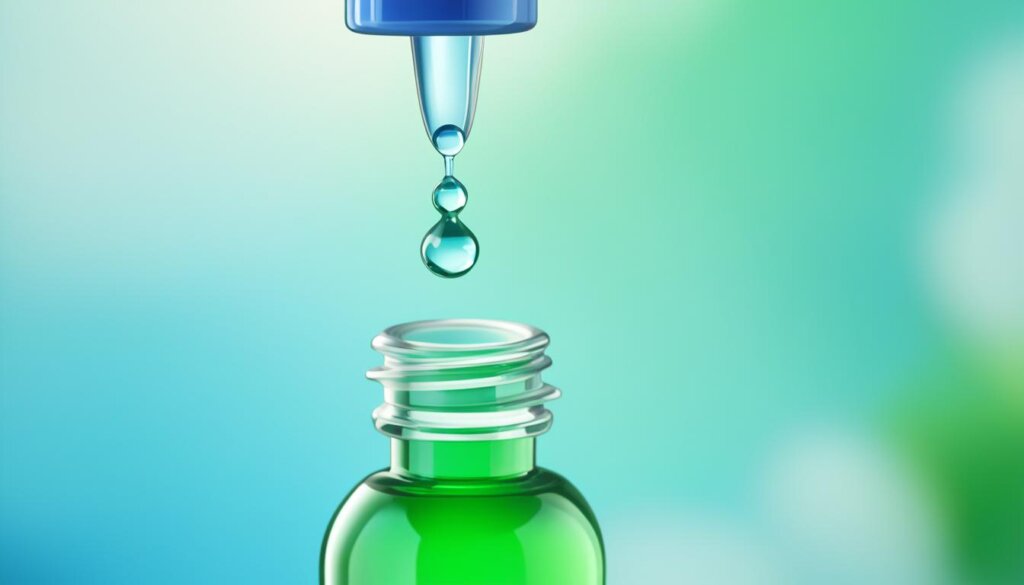
“Eardrops can be a convenient and effective way to treat outer ear infections, but it’s crucial to use them properly and under the supervision of a healthcare provider.”
Ginger: A Natural Anti-Inflammatory
Ginger is a strong, natural remedy for ear infections. It works to reduce swelling and pain. You can put a bit of ginger juice around the ear, but not inside it, to feel better.
Its abilities to fight infection and ease pain make it great for earaches. Some research suggests ginger can even battle the bacteria causing the problem.
If you’re using ginger for your ears, try this:
- Peel and grate a small piece of fresh ginger.
- Press the grated ginger to get the juice out.
- Put a few drops of the juice on the sore ear with a clean dropper, just on the outside.
- Do this a few times daily to help with pain and swelling.
But, talk to a doctor first, especially if your ear keeps hurting or gets worse.
Other remedies like garlic, basil, and tea tree oil can also help with ear pain. Always check with a doctor before trying them to make sure it’s ok for you.
Using these natural treatments might keep you from needing strong medicines. But watch how you feel and get help from a doctor if things don’t get better or if they get worse.
Warm or Cold Compress for Ear Infection
Ear infections are pesky, but several home remedies for ear infection provide natural relief. These methods, including herbal treatments and soothing compresses, are a great alternative to medicines.
Warm or cold compresses are among the top home remedies for ear infection. A warm one soothes pain and discomfort. A cool one fights off inflammation. Gargling salt water also helps by calming the throat and reducing swelling.
Using herbs is another effective holistic treatment for ear infections. Garlic, a natural antimicrobial, can be applied to the ear. This helps battle the infection from within. Basil and tea tree oil are also known to relieve symptoms.
Good DIY ear infection remedies focus on aiding the body’s healing ability. Being well-rested and avoiding stress, smoking, and too much alcohol helps the body recover.
Be careful with home remedies to avoid making the infection worse. For babies, breast milk can help soothe the outer ear. It’s a natural source of antibodies for them.
If the infection doesn’t get better, see a doctor. They can check and give you the right help, like antibiotics. With a mix of home and doctor’s care, you can heal and feel better.
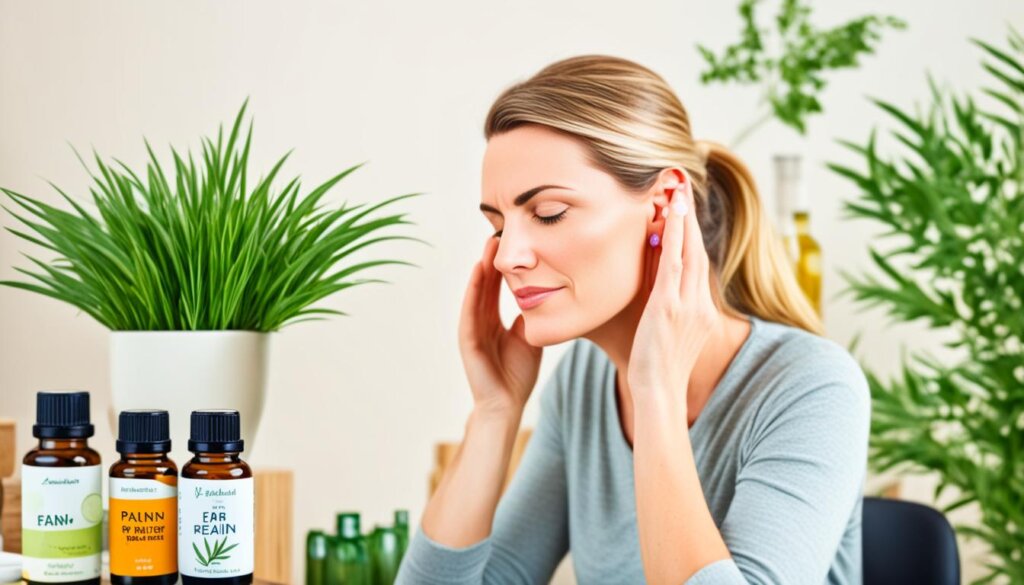
Combine home remedies for ear infection for natural healing. Always talk to a doctor if things don’t improve or if you’re worried. With care and professional advice, you’ll be on your way to recovery.
Hydrogen Peroxide for Ear Wax Buildup
Ear wax is made by the body to guard the skin inside the ear. But too much can cause problems like fullness, ringing sounds, and infection. Luckily, hydrogen peroxide helps deal with this buildup.
Safe Use of Hydrogen Peroxide
Products for softening earwax often have 3% hydrogen peroxide. This can reduce and get rid of too much ear wax. Remember to use it safely. How much you use and how often can vary by brand.
Here’s how to use it. Lie down with the ear that needs cleaning facing up. Put a few drops of hydrogen peroxide in your ear. Let it sit for 5-10 minutes. Then, turn your head to let the wax come out.
Hydrogen peroxide is safe for most people. But don’t use it if your ear is infected or if you have tubes in your ears. It might cause a little discomfort sometimes.
Always talk to a healthcare expert first. This is very important if you’ve had ear problems or if you ever had a hole in your eardrum. They might suggest different ways to clean your ears.
Most folks don’t need help removing earwax. But if it builds up too much, you may need some treatment. Using hydrogen peroxide the right way can help. And a doctor’s advice is always best.
To use hydrogen peroxide safely, always follow the directions. Look out for problems. Get help if you feel worried or if the trouble doesn’t go away. This way, peroxide can be beneficial for your ears.
Remedies to Avoid
Be careful with the ears and the remedies you choose. Some natural ways can help a bit. But others might make it worse or cause more problems.
Oils and Numbing Drops
A big mistake is putting oils like garlic or tea tree in the ear. They might make things worse by hurting the skin. And the infection could go deeper into the ear. Using numbing drops from the store might stop pain a little. But they hide the real problem. Then, you might not get the help you really need.
Instead of these risky things, talk to a doctor. They can tell you what will help. And what’s safe to use at home. Stick to ways that doctors approve. Or try stuff you can buy without a. They are better choices.
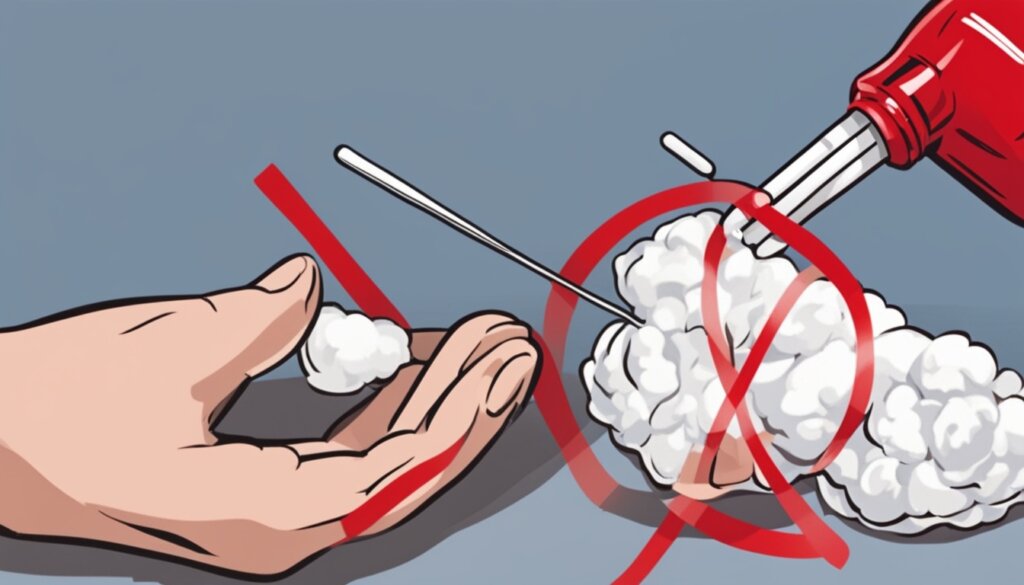
It’s easy to want a fast answer. But some home fixes can be bad for ear infections. Your health and safety come first. If the problem doesn’t get better, see a doctor right away.
“The best approach is to consult a healthcare provider, who can properly diagnose the type of ear infection and recommend the appropriate treatment.” – Dr. Jane Doe, Ear, Nose, and Throat Specialist
When to See a Doctor
Many mild ear infections can be handled at home. But, it’s key to see a doctor in some cases. If pain goes on for over 48 hours, or you get a high fever, it’s time. Also, seeing fluid or pus come out of your ear is a sign to get medical help. Babies under 6 months with a fever above 102°F (39°C) or a lot of ear pain need to be seen by a doctor too.
It’s important to get care quickly for a few reasons. First off, it makes sure the infection is treated well and stops any problems. Plus, severe pain, high fevers, or hearing changes could mean a more serious problem. This might need special treatment, like antibiotics.
The Centers for Disease Control and Prevention has advice too. They say see a doctor if ear infection signs last more than 2 or 3 days. This includes pain, fever, pus, fluid from the ear, hearing loss, or other bad signs. Adults should also go to the doctor if symptoms keep up for more than 3 days or if pain or fever is very high.
Giving your ear infection proper medical care is key to avoid big issues. Don’t take ear infections lightly because they can lead to hearing loss. Recognizing the signs early helps keep you and your family healthy.
Symptom | When to See a Doctor |
|---|---|
Persistent Ear Pain | If pain lasts more than 48 hours |
High Fever | Fever over 102°F (39°C), especially in children under 6 months |
Fluid or Pus Drainage | Any visible drainage from the ear |
Hearing Changes | Sudden or persistent hearing loss |
Severe Symptoms | Symptoms that worsen or do not improve within 2-3 days |
Knowing the signs of a serious ear infection is important. It helps you get quick medical help and avoid big problems. Getting professional care keeps you and your family healthy.
Antibiotics for Bacterial Infections
If an ear infection is from bacteria, antibiotics might be needed. They kill the bacteria. But if the infection is from a virus, antibiotics won’t work.
Always follow your doctor’s advice. Take all the antibiotics they give you. If you stop early, you might help create super bugs that are hard to kill.
Doctors and parents often talk about using antibiotics for ear infections. Some ear infections get better by themselves. For others, antibiotics are useful. Your doctor will discuss the good and bad points of using them.
Using antibiotics can cause problems like diarrhea and allergies for a few kids. The doctor will help you decide what’s best for you. It’s important to talk about the risks and benefits together.
“Failing to complete the entire prescribed course of antibiotics can result in recurring infection and bacteria becoming resistant to antibiotic medication.”
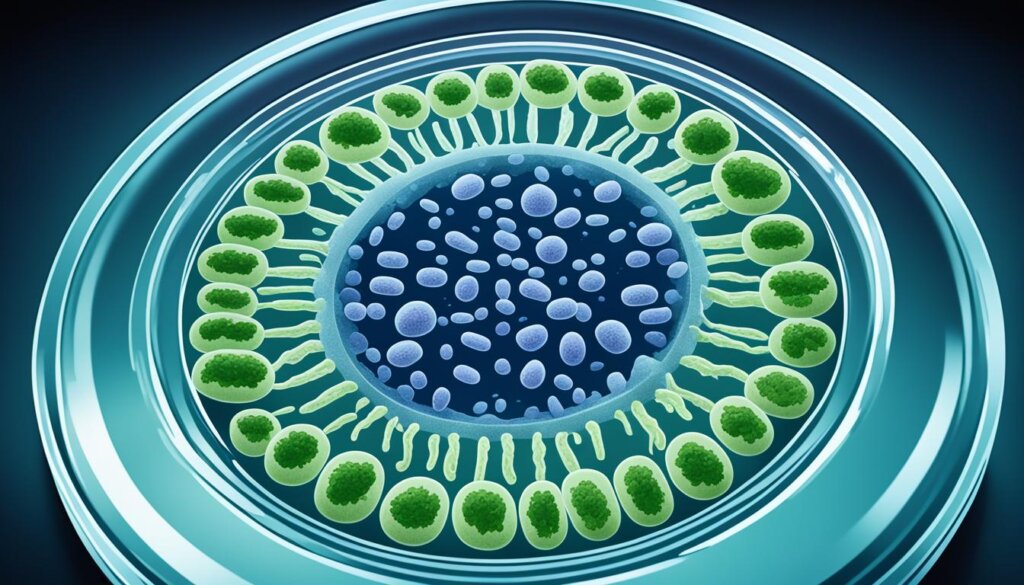
Taking antibiotics for an ear infection needs a doctor’s advice. Think about what’s best for your health. Knowing the facts helps you and your doctor make the right choice.
Preventing Future Ear Infections
Lifestyle and Hygiene Tips
Making healthy choices and keeping clean can help avoid ear infections. You lower your chance of getting sick with some easy steps. This way, your ears stay in good shape.
- Wash your hands often with soap and water. This stops the spread of germs that cause ear troubles.
- Don’t forget your vaccines. For kids, shots like the pneumococcal one protect against common ear infection bacteria.
- Avoid places where people smoke. Secondhand smoke makes ear infections more likely. So, keep clear from smoky areas.
- If you’re a mom, breastfeeding helps your baby fight off ear bugs. Try nursing for 6-12 months to lower infection risks. Breast milk has stuff in it that makes your baby’s body stronger against harmful germs.
Keeping your ears clean is also very important. But, don’t use cotton swabs deep in your ears. Doing this can make infections more likely.
Preventive Measure | Benefit |
|---|---|
Frequent handwashing | Reduces the spread of viruses and bacteria that can cause ear infections |
Pneumococcal conjugate vaccine | Protects against the bacteria commonly responsible for ear infections |
Avoiding secondhand smoke | Lowers the risk of ear infections, as smoke exposure can irritate the ears |
Breastfeeding for 6-12 months | Provides antibodies that boost the immune system and reduce ear infection risk in babies |
Avoiding cotton swabs | Prevents pushing earwax deeper into the ear canal, which can lead to infections |
Use these tips in your life daily to cut the chances of ear infections coming back. Keep your ears healthy this way.
“Proper ear hygiene and avoiding behaviors that can lead to ear infections are key to preventing future issues.”
Staying healthy and clean is your best shield against ear problems. Enjoy better ear health for a long time. It’s all about choosing right and being careful.
Conclusion
Ear infections are common and uncomfortable. Many home remedies can help ease the pain and help you heal. It’s good to know what causes ear infections, like colds or earwax. This helps you take steps to solve these problems. You can use many natural treatments, from over-the-counter pain relievers to apple cider vinegar, for relief.
If the pain doesn’t go away or gets worse, see a doctor. This is especially important for high fever or ear pain in kids. Using home fixes and getting medical help early can often stop the need for serious treatments. To treat ear infections at home, know what causes them, try simple remedies, and see a doctor if it’s not getting better.
By sticking to these tips and using natural ways, you can help your ears stay healthy. Always talk to a doctor if you’re worried or if the pain lasts. These steps will let you help yourself and maybe prevent worse ear problems later.
FAQ
What are the different types and causes of ear infections?
Ear infections happen in the inner, middle, or outer ear. They can come from bacteria or viruses. They often follow a cold or the flu.
When should I try home remedies for an ear infection?
Home remedies can help when an ear infection is mild. They work well as symptoms start getting better. But, go to the doctor if the pain doesn’t stop, you get a fever, or fluid comes out of the ear.
What are some effective home remedies for ear infection pain relief?
To ease ear infection pain, try a warm or cool cloth on the ear. You can also use OTC pain pills. A humidifier can help too.
How can proper positioning help with ear infection drainage?
Sleeping on the healthy side or using extra pillows can help fluids move out of the ear. This decreases pressure and pain.
Can ginger be used to treat ear infections?
Ginger’s anti-inflammatory properties may help with ear pain. But, just use it outside the ear. Don’t put ginger juice into the ear.
What home remedies should I avoid for ear infections?
Avoid putting garlic or tea tree oil in the ear. Also, stay away from numbing drops. They can do more harm than good.
When should I see a doctor for an ear infection?
Go to the doctor if pain or fever lasts more than 48 hours. Also, if you see fluid, or your hearing changes, seek medical help.
When are antibiotics prescribed for ear infections?
A doctor may give antibiotics if it’s a bacterial ear infection. They don’t work for viral infections.
What steps can I take to prevent future ear infections?
Preventing ear infections means staying healthy and clean. Wash your hands, get vaccinations, avoid smoke, and care for your ears.
